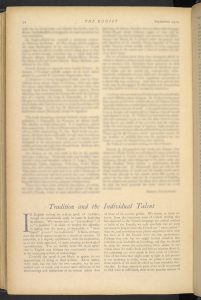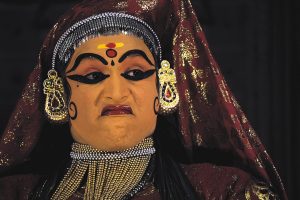This essay was translated for MULOSIGE by Munir Fayyaz.
What is Tradition? “Rivāyat kya hai?”
from Ādmi aur Insān
by Muhammad Hassan Askari (1919-1978)
Translated into English by Munir Fayyaz
To find the original essay in Urdu, please turn to pages 635-642 here.
___________________

Photo by Alisa Golovinska on Unsplash
A geometric exterior for the house, a Rococo style vestibule, a living room filled with furniture from the era of Queen Anne, new Italian chairs in the drawing room, electric dishwashing arrangements in the dining room along with a Japanese dining table, handmade rugs by Native Americans in the bedrooms, and artificial African masks for decoration.
You can easily find this type of house in America these days. The resident of this house will describe Ezra Pound as ambiguous but he has collected all these things because UNESCO has said that we must preserve the traditions of human culture in our contemporary high-speed era. Not just the tradition of one’s own city or country but the tradition of whole world. The poor fellow doesn’t even know what human history really is. The goods he has gathered from here and there may or may not be historically or culturally significant, and even if they were, he wouldn’t know if it is of any good to preserve them. He obeyed UNESCO. It is his duty to both keep modifying himself in line with the age of space travel on the one hand and to preserve human culture on the other. This venture holds a great poise and pause when viewed from the perspective of Urdu critics because it has an amalgamation of new and old, of traditional and modern. However, the resident doesn’t know what he is doing.
The writers say they know what they are doing. We like to say these days that human self-consciousness has progressed a lot. Eliot has said so too. That’s why the price of both tradition and experiment are very high in the literary market-place. There are many poets in America who can compose a poem in any of the traditional styles in five minutes if you ask them too and it would be really difficult to differentiate it from them ‘originals’. This shows that poise, pause and sobriety have evolved in writers and that both tradition and experiment are flourishing simultaneously. It is necessary to understand the real meanings of ‘tradition’ and ‘experiment’ if we are to celebrate the progress of civilization. Modernism and experimentation are this: that one says thing such that have never, or only rarely, been said before. But tradition?

Tradition and the Individual Talent, T.S. Eliot. Source: Wikimedia Commons
What is the concept of tradition in the mind of an average writer? I picked up an English book to know about it in which there was a detailed argument between different writers on tradition and experiment. One says that the tradition of English novel is experiment. The other one says that tradition is mere quintessence of diverse and different experiments and nothing else. The third one says that tradition is ever changing and ever emerging and we keep on creating it all the time. The fourth one says that the tradition of every art is different from others. The fifth one says that tradition can never be completed. The sixth one founded his argument on this saying of Wordsworth that a great writer is the one who expands the circle of human sensuousness to such an extent which was not there before. All these statements conclude that tradition itself is nothing. It has no constant value, just this that when some literary piece becomes older, it is referred to as tradition.
If this be the meaning of tradition, who knows why UNESCO and many other civilized persons are so concerned for preserving it. Such traditions can make and break every day.
But it is probable that tradition has some clear meanings as well. Eliot claims to have a clear concept of tradition in his mind and in today’s English and Urdu criticism the fame of tradition owes greatly to his writings. Let’s try consulting him.
Keep two things in mind about Eliot; firstly, he is a Roman Catholic or likes this faith, and secondly, he lays stress on Historical Consciousness which he explains as having the concept of both time and timelessness, distinctly and mutually. According to him, writer becomes traditional by such consciousness.

A kathakali performer portrays one of the many distinct facial expressions of the Natyashastra. Evan Silver, CC BY-SA 4.0, via Wikimedia Commons
While discussing tradition Eliot says that the first and fundamental function of literature is to impart a certain type of subtle mental pleasure. This thing has always been there and will always be there. This might be true to the western ideology of literature but in traditional Eastern society literature and art have always been considered a means and their prime purpose is to enlighten the reader with knowledge. The Europeans, and now many Hindus too, say that religion and art are one and the same thing. But it is explicitly stated in the Natiya Shastra that when human beings started deteriorating, Barahma created music and dance for their convenience. Then Eliot says that we can look at literature through our humor and every generation has its own perspective. On the other hand he says that it is a prerequisite to have clear moral standards in order to have clear literary standards. Is humor and moral standard one and the same thing? Are these moral standards self-affixed or do they keep changing with time? And where do they come from? Eliot didn’t heed to any of these basic questions. He thinks that every generation reads literature in its own way and changes the past and tradition depending upon this perspective. He opines that tradition is not something that cannot be altered or something that is static. He also says that the ‘mind, or intellect, of the European continent has always been changing but despite these changes it has not excluded anything from within. What are the things that Europe’s mind has still contained within? Eliot is a great lover of Dante but how would he know on what principles and grounds Dante chose his meter and his phrase structure in each line? Is the mind of today’s Europe aware of the concepts of Ibn e Arabi that provided the basics for Dante’s poetic works? If Europe in not aware of them, hasn’t it lost many parts of its mind? Tradition, according to Eliot, can change, but in Ibn e Arabi it is a founding principle that it cannot change. This moves us to conclude that Europe, and Eliot, didn’t even preserve Dante. Then what tradition is it whose awareness Eliot deems obligatory?
Eliot considers acquaintance with new fields of knowledge like linguistics essential for understanding tradition. The handicap of new disciplines in the West regarding tradition is worth seeing. The Hindi word ‘jaati’ became ‘zaat’ in Urdu. This is just a phonetic variation according to the Western conception where ‘j’ is replaced with ‘z’. But it is pure translation. The word Zaat (Being) primarily refers to God but its degrees evolve when it comes to spiritual stages. The reality of an individual in the Hindus is set by his Jaati (caste). Therefore, in social circle, Jaati of an individual is his Zaat so the word jaati has been translated as zaat. This one example makes it clear that to which extent the Western disciplines are helpful in understanding tradition.
Now have a look at even a more surprising statement of the Roman Catholic Eliot. He says that tradition is not dependent on faith and faith evolves during the formation of tradition. Religion becomes a play if faith evolves in this manner. The fact is this that Eliot shirks the word ‘faith’ like Gibbon despite his being a religious person. Europe, in fact, doesn’t know what faith is. In East, faith is a phenomenal thing and there are methods of bringing it into direct practice. Even the church has forgotten the nature of faith after the 14th century. Therefore, during last three hundred years faith has become either a dictating doctrine or a frozen passion. Europe does not know beyond this. Eliot pronounces that the mind of Europe has not wasted anything. The changes that occurred in Europe were according to Eliot caused by economy and industry. What is the value of such faith that can modify with the invention of washing machine?
Eliot brings faith down to this level. While defining tradition he says tradition is combination of all the actions from practical rituals to greeting one another that have become part of routine for inhabitants of a place or for a generation. Eliot is also saying the same thing about tradition that a score of other people say as well. Tradition means habit. But this habit is a very weak thing. Why such stress on keeping habit alive? Eliot’s issue is this that he likes both the religion and Darwin. He has complicated the issue of tradition by creating a noise about it. His friends Wyndham Lewis says that he has made it completely obscure.

Hall leading to the chamber holding the Magna Carta.
Theo1239 at English Wikipedia, Public domain, via Wikimedia Commons
Anyhow, the word of tradition entered the fashion under Eliot’s influence. Now everyone admires tradition but the issue is this that a write or a work included in tradition by one critic is expelled from the tradition by the other. F. R. Lewis is the best example for it that expelled Fielding from the great tradition of the English novel. In west, every person has established a different concept of tradition and there are no meanings in it. We can be indifferent towards criticism for being a war of status but the problem that an obscure concept of tradition is creating for the creative artists is havoc. I consider Ezra Pound the greatest poet of today’s world but he is in a strange fix for the meanings of tradition being obscure. Everyone thought that his great poem would complete in one hundred cantos but it has moved ahead now. Pound has told about the evils of the world and has also told about the good values. The issue of providing solid grounds for these values emerges at the end of the poem which Pound cannot find. He borrows moral values from Confucius but contemptuously disregards the metaphysics present at their back. Where can he find the reason for these values? Should he base on nature? But what is nature? He starts praising the Magna Carta in confusion. But it is hilarious to found human life on the Magna Carta.
Thus, it concludes that literature cannot move forward without understanding the meanings of tradition and the West completely fails in understanding these meanings. The question of ‘what is tradition?’ still remains the same.
Only one person has answered this question in the West but the West refuses to listen to this person. The person I mean is Rene Guenon. He says that traditional literature and traditional arts can only be created in a traditional society and a traditional society is founded on metaphysics. Metaphysics is not the name of some ideologies. Metaphysics can only be one and solitary. This is the real and fundamental tradition. It does not belong to any country or race but its methods of expression vary and the difference between the Hindu tradition, the Chinese tradition and the Muslim tradition is owing to the difference in method of expression. People here understand that the Muslim tradition is dry and the Hindu tradition is sensuously colorful but it is written in the Upanishad that there is neither the light of the sun, nor of the moon and stars in the nucleus of human being but everything is bright with the light of man. So, the basic tradition is all the same everywhere, only its presentations differ.
What is this metaphysics? As literature relates to the connection between Man, God and Universe, I’ll only present the relevant portion of this fundamental tradition. Shah Wahaj ud Din briefly mentions the complete thing in preface of “Al Kahf o Ar Raqeem”. He writes:
When you remember the Absolute being in purity it is the being of God; and when you remember it in proportion to the stages of purity it is spiritualism. When you see it purposefully it is materialism. The being of man means the absolute being. Soul of man means sum of the living and universal souls. Body of man is the extract of living and universal materialism.
This is the very concept that is the root of tradition. Literature is traditional only if it is founded on this concept. It cannot be called traditional by the mere use of words and stylistics.
Sha Wahaj ud Din has also mentioned some principles of understanding and evaluating literature by this metaphysics. He has written only a few lines about literature but you will seldom find such a valued literary critique in Urdu. He has presented such standard that dominates world literature. Look at his statement now. First he has stated that there are only two standards for man to gain knowledge, soul and universe. He writes afterwards:

Photo by Greg Rakozy on Unsplash
It becomes perfect when both are jointly identified and identity of soul dominates identity of universe. Because universe is body and soul is its spirit. Nothing exists in the universe outside its conscientiousness in the soul. Every fiber of soul is a world for the universe. That’s why the poetry of every past age perfects by domination of soul on universe and regarding nation and state, soul has always been declared the loved one. The natural poetry of the day that is much liked is incomplete because it only relates to universe leaving soul which is the life of universe. So, this poetry is like a lifeless body. The objection of hyperbole and exaggeration on the older poetry is based on misunderstanding as nothing about soul can be termed as exaggeration.
With the help of these two excerpts we not only get the meaning of tradition but also find a standard to evaluate worth of any literary work. We are also keen here to preserve tradition and promote it but along with this we also keep proving Eliot’s word true that each generation reads literature in its own way. There comes a special issue in reading in a new way about what place Nazeer Akbar Abaadi holds in the tradition of literature. We know that despite his popular fame he was not given a niche in literature for almost in a hundred years. Therefore, some said that people in older times had a lower level of literary taste. Some said that in the time of feuds, a poet of commoners had to be considered of baser sort. But both of these statements are raw if you look closely. You will understand clearly if you apply the standard of Shah Wahaj ud Din. The poets like Nazeer Akbar Abaadi have a significant duty in traditional societies and they have been valued for this. But in major part of Nazeer Akbar Abaadi’s poetry, universe dominates and mention of soul is less. This is why he is not classifies among great poets.
We take second example of Maulana Haali. Haali is apparently a traditional poet but look at his Naat; he uses the diction of Naat but is putting morality in it leaving metaphysics aside. Haali did great benefit to Urdu literature but his contribution to tradition is this that he expelled metaphysics from Urdu poetry.
Take an example from prose. We include Sarshaar’s name among the founders of Urdu prose. In a chapter of Fasaana e Aazaad, Mr Aazaad sees a Reshaael (a person with thick and long beard) who is frolicking with kids. He throws the basket of a cucumber seller in some water and frees birds that were held in a hunter’s cage. We later find out that he does so to protect children’s health and out of human love. Sarshaar obviously took the real scheme from the tale of prophets of Moses and Khidr but used it for teaching hygiene instead of metaphysics. Consider for yourself if this is tradition or something else.
Modern poets have deliberately violated tradition but it is said about Faiz that he has preserved tradition. See his famous line:
Hum parwarish e loh o qalam kartay rahain gay
(We’ll keep breeding pen and tablet)
This is very good poetry. The diction is also traditional, there is no question about that. But does it sound traditional meaningfully? You should ponder on these questions yourself. My intention was to show that tradition can mean only one thing. The talk of keeping tradition ‘alive’, leaving this aside, is nothing but emotional scratching.


Leave A Comment